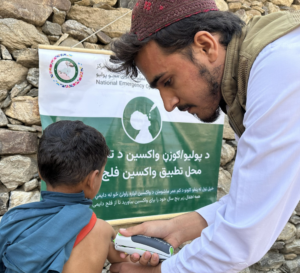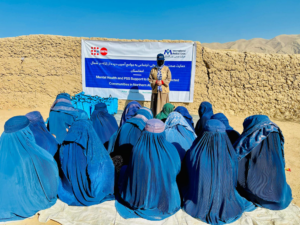With KSrelief, UNICEF is powering 13 hospitals to store vaccines safely for women and children in Afghanistan.

By Rebecca Phwitiko
First published March 10, 2025 by UNICEF
Khatera is used to handling crying babies and anxious mothers.
Her work requires it. She is a vaccinator at Farah Provincial Hospital in western Afghanistan, vaccinating about 50 children every day. Khatera also teaches mothers about the importance of vaccines, reminding them of required follow-up visits to keep their babies up to date with all their doses.
“I have been doing this for 12 years and am very happy to work for the health of women and children,” says Khatera.

Maintaining a high-quality cold chain
Vaccines are sensitive to temperature and therefore require careful storage and transportation to keep them cold and potent until they reach children. If the temperature is too high or too low these life-saving doses can lose their ability to protect against disease.
In hospitals, where vaccines are kept in a refrigerator or a cold room until they are administered, round the clock power supply is critical.
With funds from the King Salman Humanitarian Aid and Relief Centre (KSrelief), UNICEF procured 13 generators[1] which are now being used in hospitals across Afghanistan to keep immunization services running smoothly for children. These generators also provide critical back-up electricity for other clinical services when required.

In a country where the potentially deadly polio virus remains endemic and measles and other disease outbreaks are common, routine immunization services complemented by vaccination campaigns are particularly important to close immunity gaps.
A commitment to immunization for every child
The provincial vaccine storage facility in Farah has the capacity to store up to 1 million vaccine doses for both routine immunization and polio vaccination campaigns, thanks to previous support from UNICEF, Gavi and the Government of Japan to procure and install storage equipment such as cold rooms, refrigerators and more generators.
Every month, thousands of vaccine doses are carefully dispatched from the provincial vaccine storage facility to 74 health facilities, including Farah Provincial Hospital.
The hospital gets a monthly supply of about 2,000 to 2,500 vaccine doses, which are then stored in refrigerators in the hospital’s immunization unit.
Khatera and other vaccinators at the provincial hospital use this stock to vaccinate children and women against at least 12 preventable diseases including measles, polio, pneumonia, meningitis, tetanus, tuberculosis and diarrhea. The hospital targets 220 babies under a year old for polio and measles vaccination.

Farah Provincial Hospital provides in-patient care to about 2,700 patients and outpatient care to 137,000 people every month. Beyond supporting the safe storage of vaccines, the newly installed generators are also powering day-to-day hospital operations including surgeries and specialized care for newborn babies.
[1] As of 9 March 2025, 12 generators are fully functional while the generator at Farah Provincial Hospital is undergoing repair.
Related Articles

Protecting Children Without Fear: A New Way to Vaccinate Against Polio in Afghanistan
Needle-free jet injectors are transforming polio vaccination in Afghanistan, eliminating fear and building trust among families who previously hesitated—and helping bring one of the world’s last polio-endemic countries closer to eradication. From the Global Polio Eradication Initiative

Global Relief in Focus: 10 Images that Defined Humanitarian Aid in 2025
2025 was a year filled with conflict, disaster and disease—as well as the work of committed and courageous humanitarians who did everything they could to help. These photos from International Medical Corps highlight the people who made it happen.

Helping Communities in Northern Afghanistan Heal
When a devastating earthquake left thousands homeless and fearful, International Medical Corps stepped in with lifesaving care and emotional support, helping families find hope and resilience.
